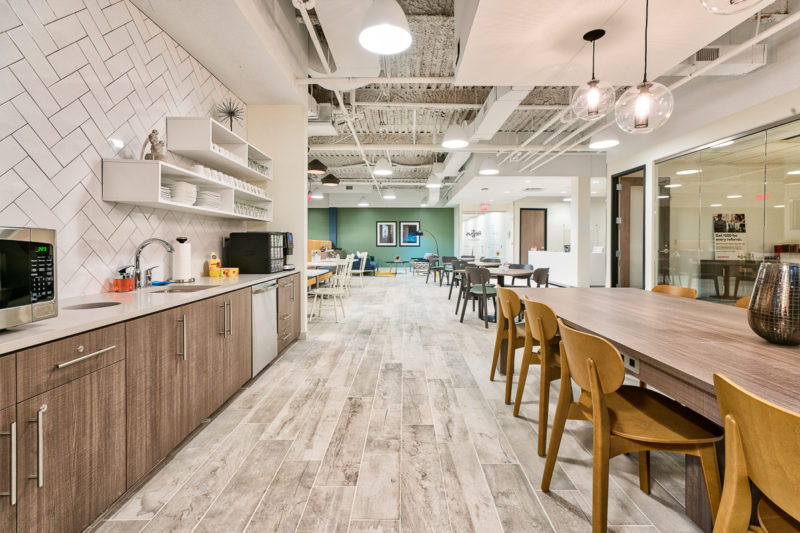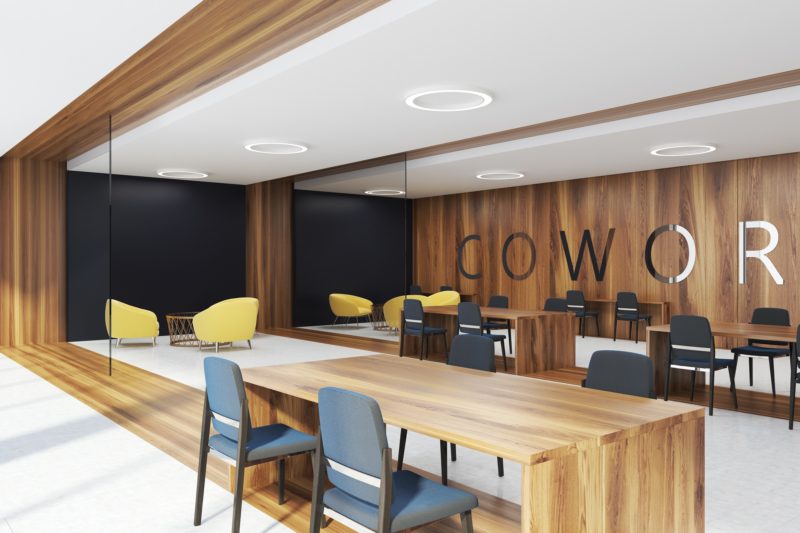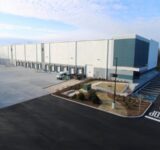New Jersey is poised to grow its footprint in the co-working and flexible office space sector, providing another source of absorption for its overbuilt office market.
By Joshua Burd
The country’s largest cluster of co-working and flexible office space is only just across the Hudson River, but the fast-growing industry is still largely absent from New Jersey.
Experts say that is due to change — and it’s only a matter of time.
Already, landlords in some of New Jersey’s largest mixed-use projects have incorporated co-working into their properties. The state is also home to several independent, lesser-known third-party flexible space providers, while WeWork and other larger players have been weighing their options in the Hudson waterfront and other major submarkets.
The combined activity could provide another source of absorption for New Jersey’s excess office space in both top submarkets and underperforming locations. And for flexible space providers that are increasingly focused on large corporate users, the state has much to offer.

“When you look at space as a service, there’s room in our market for that,” said Jeremy Neuer, an executive vice president with CBRE. “It’s not yet prevalent in our market … You don’t see that enterprise use, you don’t see that major corporation use that we see in other markets, and I think that we will start to see it going forward.”
Larger clients are now set to drive the growth of operators such as WeWork, Knotel and Convene, which have evolved from an original model focused on freelancers, lone entrepreneurs and startups. According to CBRE, co-working space now totals more than 25 million square feet across the country’s 30 largest office markets, but the sector is far less visible in New Jersey.
To that end, CBRE researchers found last fall that flexible office space accounted for only about 841,000 square feet of the state’s total office stock, a roughly 0.5 percent share, which is the lowest among 11 major markets surveyed by the firm. By comparison, flexible space accounted for more than 2.5 percent of the inventory in three markets — Manhattan, Boston and San Francisco — while most others ranged between 0.7 and 1.6 percent.
The Garden State is now poised to increase its share, as insiders note that WeWork has ramped up its search over the past year for space in the state. Multiple people familiar with the search say it has engaged some of the state’s biggest landlords in top submarkets such as the Hudson waterfront, Newark and the Route 24 corridor, pointing to a prospective deal in Hoboken with Mack-Cali Realty Corp. that appeared to be progressing in recent months.
A WeWork spokeswoman contacted last fall declined to comment on any potential search in New Jersey, as have prospective landlords. But several executives, including Mack-Cali CEO Michael DeMarco, have made no secret about the need to modernize their buildings in order to attract the likes of WeWork and its peers.
It’s among the reasons why the real estate investment trust has made major investments in the common spaces and shared amenities at its waterfront and high-end suburban office properties.

“It has a good product line,” DeMarco said of shared office space companies, speaking in late January during a program hosted by NAIOP New Jersey, “but they still reside in traditional buildings and they reside with the same problems that we have with most tenancy, which is that the building has to have a certain vibrancy to it.
“Now you have to have a building that has the dynamic features to it that attracts that crowd.”
DeMarco has also alluded to WeWork’s interest in New Jersey during analyst calls over the past year, along with interest from smaller operators that may be looking to expand.
That’s not to say that co-working and flexible office space is entirely missing from New Jersey. Regus, the global flexible workplace solutions provider, has long had a presence here with nearly a dozen locations in the state today. The 30-year-old operator and its parent company, International Workplace Group, recently began to offer more modern spaces such as its 16,000-square-foot location at 830 Morris Turnpike in Short Hills, seemingly in an effort to maintain a competitive edge in the industry.
The Garden State is also home to a host of independent, homegrown operators such as Indiegrove, PrimeWork and Cowerks, which span both urban and suburban locations.

“It just seems to be a natural evolution,” said Kieran Flanagan, a principal and co-founder of Hollister Construction Services, which recently built out the new Regus space in Short Hills. The Parsippany-based firm is seeing additional requirements from Regus and other prospective co-working operators, he said, while its affiliate, Saxum Real Estate, is seeing activity at properties it owns in several downtown submarkets
The activity could provide a lift to an office sector that has otherwise been flat.

“There’s a consistent amount, but there are no real spikes in the office market in terms of construction that we’ve seen,” Flanagan said. “But this gives a lot of promise for smaller buildings that are located in these downtown areas to really thrive and repurpose.”
Other landlords have opted to become direct providers of co-working and flexible office space solutions. In Parsippany, Bergman Real Estate Group and Time Equities have built nine co-working suites within a three-building, 280,000-square-foot campus as part of a recent overhaul of its amenities and common spaces.
Co-working is also present at some of the state’s most high-profile, mixed-use environments. CoLab, which is part of the 2 million-square-foot Bell Works complex in Holmdel, has roughly 100 people in its space on a given day and has continued to grow since opening in 2015, according to Sean Donohue, who manages the facility. The space is now slated for a renovation that would expand its footprint from about 20,000 square feet to just under 30,000 square feet, he said, noting that he only sees demand growing in early 2019.
Preferences from co-working users have also evolved. Early on, Donohue said many users were content with simply coming in and taking unassigned “hot desks,” whereas CoLab is now seeing stronger interest in dedicated workstations or single private offices. The shift has allowed users to find privacy when they need it and “establish a little footprint of their own, but still be close to the energy of the larger space.”
Meeting that demand from co-working users also means providing shared amenities, which are abundant at Bell Works. The now-repurposed former Bell Labs complex has welcomed a host of retailers and restaurants to its indoor pedestrian plaza. Members at CoLabs also have the benefit of being under the same roof as dozens of other companies that lease office space at the property, including some of the state’s largest technology firms.
“I think a lot of the co-working members here appreciate the fact that they’re within arm’s reach of a lot of our anchor tenants and all of the midsized tenants as well,” Donohue said. “I think it really speaks to the ‘metroburb’ concept and the idea that we want companies of all shapes and sizes to have opportunities to collaborate and mingle together.”










